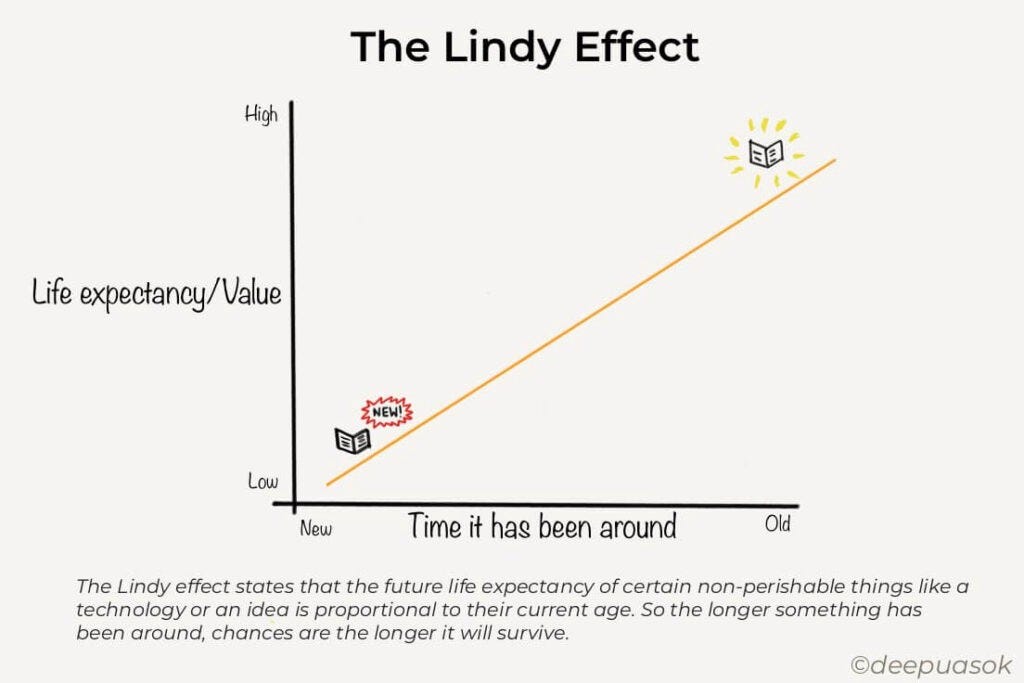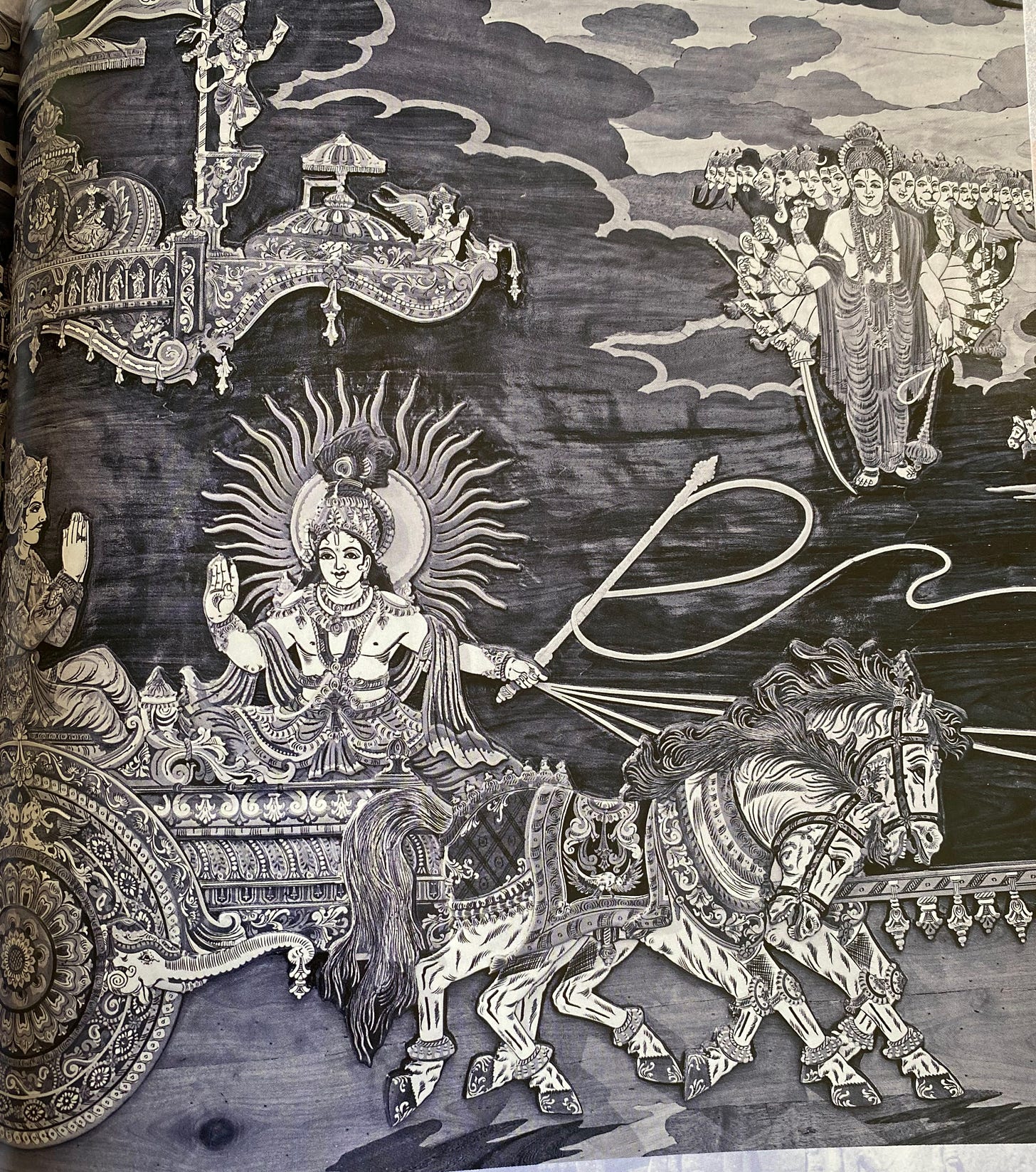MONTHLY MULLING 💡
The Stupidest Reading Advice, History Rhymes & The Mahabharata
Hi👋 Tapan here.
Monthly Mulling is a bi-monthly newsletter curating the best ideas from the web to your inbox for free. High signal. Low noise. Join now👇🏽
Note: If my emails end up in the ‘promotions’ tab, please move them to the inbox so you don’t miss out.
Happy Sunday y’all!
In today’s newsletter, I have tried connecting three different ideas - history, reading, and the Mahabharata! 😶🌫️ Hopefully, it’s an interesting read. It’s definitely a long one!
Let’s quickly get started,
📖 Currently reading: Thinking in Systems by Donella Meadows
📺 Currently watching: Colgate: Dentist’s No. 1 Scam by Aevy TV (Thanks Suraj - check out Suraj’s reels if you like Johnny Harris-style content)
📜 History Rhymes
I am a self-proclaimed history buff and this article by Morgan Housel hit the nail on the head.
You think your pain and your heartbreak are unprecedented in the history of the world, but then you read.
It was reading books that taught me that the things that tormented me most were the very things that connected me with all the people who were alive, or whoever had been alive.
- James Baldwin
Everything feels unprecedented if you haven’t read history.
People were dealing with greed and fear 100 years ago the same way they’re dealing with now and will be 100 years in the future.
Marcus Aurelius said, “We all love ourselves more than other people, but care more about their opinion than our own”.
Part of the value of reading an Aurelius quote like that is that he said it almost 2,000 years ago.
Its age is the important part.
If it was true then, and it’s true today, then it’s a fundamental part of how humans work and of course, it’s going to be true for the rest of my life.
- Morgan Housel
This ties in with the idea of the Lindy Effect popularised by Nassim Taleb.
Ideas in books that have been surviving for a long-time and are still relevant, chances are that they will survive as long in the future.

🤦🏽♂️ The Stupidest Reading Advise
Reading fewer but “high-quality” books per year is more important than the quantity of books.
I read this on Twitter and I think it’s the stupidest reading advice.
My response will always be, how do you find those "high quality” books? Each book impacts each individual differently. A book that had a huge impact on my life might not impact you at all.
You need to go through a large number of books to find those quality books.
Here are a few other lessons that I have learned from the last 7 years of reading.
🛑 Quit more books: Don’t waste your time reading mediocre books. If you don’t find the material interesting, quit it. I treat books like online articles or YouTube videos. The author needs to retain my attention.
Start more books, quit most of them.
- James Clear
📜 Lindy Effect: Ideas from books that have been around for 1000 years, will remain relevant for another 1000 years. Don’t be afraid to pick up old books.
I don’t want to waste valuable time reading any book that has not had the baptism of time. Life is too short.
- Haruki Murakami
🫣 Move away from mainstream books: Atomic Habits is a good beginner book. But it was written for a large number of readers. The content is generic and basic. Once you have developed a reading habit, delve into books that are not mainstream. That’s where you will find “quality” content.
If you only read the books that everyone else is reading, you can only think what everyone else is thinking.
- Haruki Murakami
👀 Topic and application matter: A lot of friends ask for book recommendations. My response is usually, what’s a genre of TV you have been watching recently and what topic interests you right now? Choose the books based on topics that have your attention currently.
👎🏽 Self-help is garbage: People usually start their reading habit with self-help books to “improve” themselves. The issue with self-help is that authors write 300 pages on one simple idea. The idea is usually a one-pager and the remainder of the book is stories making the same point over and over again. IMHO historical, philosophical, and good fiction books are better self-help.
🤝 Talk to the author: Reading books is like having a conversation with the author. Take a lot of notes and don’t be afraid to criticize them. You should have a debate with the author and tell the author if they are wrong. Don’t take it at face value because it’s written in a book. That’s how the actual learning happens.
💪🏼 Read good books multiple times: Once you have found books that actually have an impact on your life, read them over and over again. Each time you will find something new. These are the “quality” books!
You will find that when you read a large number of books per year, you will usually find one or two “quality” books.
🧐 The Greatest Piece of Philosophy - Mahabharata
I have been re-reading the Mahabharata but this time an illustrated version of the epic. It adds more colour to the writing (yeah, not sorry about that pun).
Mahabharata is one of the books that I would describe as a “high-quality” book having a huge impact on my life.

I read the Mahabharata from a philosophical point of view. Unfortunately, Mahabharata (and Ramayana) have taken a rather religious “sacred” text form in modern Bharata history. This causes a lot of people to not look at it rationally, as a lot of emotions are involved, consequently missing out on the underlying lessons 🤦🏽♂️
For me, the point of reading old texts is not the specific details of certain events, which are always random and never repeat; it’s the big-picture lessons that reoccur in different eras, generations, and societies.
It is speculated that Mahabharata was written as a way to communicate the knowledge of the Vedas (the original text of wisdom) with the common people of the region, a tale that would resonate with the simplest of men.

So, here is a very basic introduction to the Mahabharata with the hope that you would attempt to read at least one of the translations:
Mahabharata is one of the ancient “Bharata” epics with over 200,000 individual verse lines. Yes, it is roughly ten times the length of the Iliad and the Odyssey combined!
It has been revised many times and hence, dating it is very difficult. The Kurukshetra war around which the content of Mahabharata is written supposedly occurred in 3137BCE. The Battle of Ten Kings is supposed to be the inspiration for the Kurukshetra War.
The Mahabharata is full of important lessons on how to lead a good life. You have lessons on vengeance, envy, greed, selfishness, meditation, self-doubt, and all the other “sins”. If you’re looking for an investing lesson in Mahabharata, there’s one for you.
There is something for everyone.
Whatever is found here, may be found elsewhere; but whatever is not in it, cannot be found anywhere else.
- Mahabharata epilogue
It explains the idea of Dharma which I will write about in a later issue of the newsletter.
Mahabharata also consists of the Bhagavad Gita which is now considered a sacred text in the Hindu religion.

The Gita is considered a later addition to the Mahabharata and historians date the text in its current form to 300CE.
The Gita has 18 chapters and my favourite is chapter 5 detailed below,
He who does not desire and he who does not hate, know him to be a perpetual sanyasi (renouncer). Freed from opposites, he is happily freed from bondage.
The ignorant, not the wise, speak of renunciation and action as distinct. If one of these is followed properly, the fruits of both result.
He whose happiness is inside, he whose pleasure is inside, and he whose light is inside, that yogi (someone who has attained enlightenment) alone has realised the brahman (reality) and obtains liberation.
Freed from desire and anger, controlled in mind and knowing the atman (real-self). such sages attain liberation in the brahman all around them.
- Karma-Sannyasa Yoga, Bhagavad Gita
In essence, it talks about how getting rid of desire and anger leads to a happier life. Navalism much?

From a purely historical perspective, the Gita acts as a transition point between Vedic and Puranic ideologies in Hinduism eventually bringing in the Bhakti movement (when people on the sub-continent started worshipping deities and idols).
You can see this in the Mahabharata text where in the earlier stage of the epic the Vedic (old) gods are seen as more dominant (Agni, Vayu, Indra) but are later overshadowed by the Puranic (new) god (Vishnu/Krishna).

Overall, the Mahabharata is a very vast body of work so I can’t do it justice in this short newsletter but I will include stories going forward. It’s one of those books that you keep reading over and over again and learn something new each time.
If you enjoy reading about Stoicism (or any other philosophy), you will definitely enjoy the Mahabharata. Some easy translations of the Mahabharata that I have read can be enjoyed by beginners
Do you think any of your friends will like Monthly Mulling like you? Please share!😇
Thanks for reading. If you have any comments, you can connect with me on Instagram, Twitter, LinkedIn, or simply reply to this email!s






